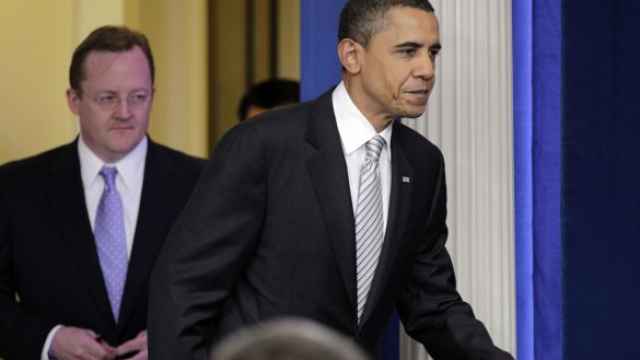WASHINGTON — U.S. President Barack Obama inched closer to winning approval of the New START arms control treaty with Russia on Tuesday as the No. 3 Republican leader in the Senate announced his support.
The move by Lamar Alexander gave Obama's hopes of a foreign policy victory a boost as the Senate moves toward a vote on ratification this week. The top two Republican leaders have opposed the treaty.
"Americans are safer and more secure with the New START treaty than without it," Alexander said.
Defense Secretary Robert Gates, in a statement Tuesday, urged the Senate to ratify the pact this week. He said the treaty would "provide the necessary flexibility to structure our strategic nuclear forces to best meet national security interests.
The U.S. administration has stepped up its lobbying of pivotal Republicans to win approval of New START, which has become Obama's main priority for the remaining legislative session.
With lawmakers moving toward a final vote expected this week, the White House and senior Democrats expressed confidence Monday that they had the votes for the accord.
Senior Democrats were pushing for a decisive vote to cut off debate and set the stage for the final vote. Republicans and Democrats were discussing amendments to the accompanying resolution, not the treaty, that would deal with Republican problems with missile defense and build support for the agreement.
Obama and President Dmitry Medvedev negotiated New START to cap nuclear weapons and restart weapons inspections in the spirit of U.S. efforts to reset the relationship between the former Cold War foes.
The White House has seen steady progress in its efforts to persuade Republican lawmakers. On Monday, Senator Scott Brown announced he would support the treaty. In recent days, Brown had received a call from Secretary of State Hillary Clinton.
Republican Senator Johnny Isakson, who also heard from Clinton, sent the strongest signal yet that he would support ratification. He said he could see no reason that would prevent him from voting yes.
Treaty backers also were heartened as several Republicans broke ranks, voting against three Republican amendments that would have effectively killed the treaty.
Obama, who delayed his holiday vacation, lobbied senators by phone as he pressed to complete the treaty before January. Vice President Joe Biden also called lawmakers.
Bolstering Obama's argument for quick action, Admiral Mike Mullen, chairman of the Joint Chiefs of Staff, sent a letter to lawmakers reiterating support for the accord.
"This treaty enhances our ability to do that which we in the military have been charged to do: protect and defend the citizens of the United States. I am confident in its success as I am in its safeguards. The sooner it is ratified, the better," Mullen wrote.
Senate Foreign Relations Committee Chairman John Kerry, a Democrat, read parts of Mullen's letter at a closed briefing.
Despite the letter, several conservative Republicans insist the treaty would restrict U.S. options on a missile defense system to protect America and its allies and argue that the accord has insufficient procedures to verify Russia's adherence.
Politics coursed through the debate Monday as Republicans were still peeved by Senate Majority Leader Harry Reid's decision to interrupt the six days of treaty consideration for votes on repealing the ban of gays serving openly in the military and an unsuccessful immigration measure, legislation they considered sops to the Democratic Party's liberal base.
"No senator should be forced to make decisions like this so we can tick off another item on someone's political check list before the end of the year," Minority Leader Mitch McConnell said.
Obama suffered a self-described "shellacking" in the Nov. 2 elections as his party lost control of the House and suffered an erosion in its Senate majority. Yet he has scored two major political wins in Congress' postelection session — overwhelming bipartisan passage of the tax deal he reached with Republicans and repeal of the ban on gays serving openly.
Democrats expect to get 57 votes from their caucus, with Democratic Senator Ron Wyden absent due to cancer surgery on Monday. Six Republican senators — Richard Lugar, Olympia Snowe, Susan Collins, George Voinovich, Alexander and Brown — have said they back the treaty, and four others — Robert Bennett, Judd Gregg, Bob Corker and Isakson — said they were leaning toward approval.
The treaty specifically would limit each country's strategic nuclear warheads to 1,550, down from the current ceiling of 2,200. It also would establish a system for monitoring and verification. U.S. weapons inspections ended a year ago with the expiration of a 1991 treaty.
A Message from The Moscow Times:
Dear readers,
We are facing unprecedented challenges. Russia's Prosecutor General's Office has designated The Moscow Times as an "undesirable" organization, criminalizing our work and putting our staff at risk of prosecution. This follows our earlier unjust labeling as a "foreign agent."
These actions are direct attempts to silence independent journalism in Russia. The authorities claim our work "discredits the decisions of the Russian leadership." We see things differently: we strive to provide accurate, unbiased reporting on Russia.
We, the journalists of The Moscow Times, refuse to be silenced. But to continue our work, we need your help.
Your support, no matter how small, makes a world of difference. If you can, please support us monthly starting from just $2. It's quick to set up, and every contribution makes a significant impact.
By supporting The Moscow Times, you're defending open, independent journalism in the face of repression. Thank you for standing with us.
Remind me later.



